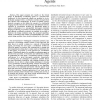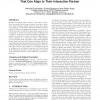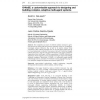374 search results - page 26 / 75 » Incentive design for adaptive agents |
ESAW
2009
Springer
14 years 2 months ago
2009
Springer
Autonomous software agents provide a promising solution to the needs of decentralised networked systems, able to adapt their behaviour in a complex and dynamically changing environ...
TASE
2012
IEEE
12 years 3 months ago
2012
IEEE
— This paper presents new results on the formal design of distributed coordinating agents in a discrete-event framework. In this framework, agents are modeled to be individually ...
ICCBR
2001
Springer
14 years 2 hour ago
2001
Springer
It is useful for an intelligent software agent to be able to adapt to new demands from an environment. Such adaptation can be viewed as a redesign problem; an agent has some origin...
ATAL
2010
Springer
13 years 8 months ago
2010
Springer
Speakers in dialogue tend to adapt to each other by starting to use similar lexical items, syntactic structures, or gestures. This behaviour, called alignment, may serve important...
IJAOSE
2010
13 years 4 months ago
2010
: The complexity and scope of software systems continues to grow. One approach to dealing with this growing complexity is the use of intelligent, multi-agent systems. However, due ...



